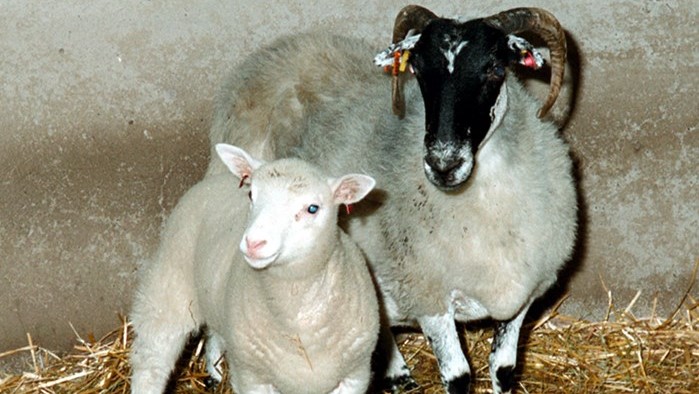The Ethics of Cloning

Dolly the sheep with her Scottish Blackface surrogate mother. One mother wasn’t enough for Dolly; two others helped bring her into existence, providing the egg and her DNA. Born in 1996, Dolly died in 2003 of a fairly common kind of lung cancer in sheep. She nonetheless lives on (in stuffed form) at the National Museums Scotland, close to home. (Roslin Institute, University of Edinburgh)
Here’s something to think about in preparation for our next article: how ethical is cloning? Let’s start with non-human animals.
Allow me to introduce Dolly the sheep. Born to three mothers (one of whom is on the right) in Scotland in 1996, Dolly was the world’s first ever mammal clone. In the UK cloning for the purposes of scientific research is legal upon application.
But in the aftermath of the Dolly’s cloning The European Union deemed the process to be highly controversial. Representatives said ‘the border was too close between animal cloning and cloning on human being[s]’ —the ‘slippery slope argument’.
So human life is too precious to clone; animal life is not? In fairness, self-awareness means cloning threatens our existence in special ways. For example, if you were cloned, there wouldn’t be two of you: such a claim would be a contradiction. There is only one you, to whom no one can be identical. But while a clone cannot share your unique identity and your future experiences, they will be fighting for the same identity as you: a stirring thought. Plus there are ethical concerns even with cloning at the primitive stage of human development. These include the ‘death’ (destruction) of many embryos, which are given the moral status of beings, and steps towards eugenics.
However, there are several avenues down which human cloning serves tangible benefits to society. Cloned embryos can be used to create cells in the development of treatments for currently incurable diseases. Reproductive cloning offers hope of parenthood to infertile individuals, same-sex couples, and couples who cannot produce together, enhancing their dignity and familial liberty and bypassing the need for cell donation.
With science we look for ways to design better quality of lives, perhaps at a moral cost. After Dolly the European Union conceded there’s a debate to be held around human cloning for the purposes of medical research. And there’s precedent: in the US human cloning isn’t completely illegal, depending on where you are, and in the UK experimental stem cell research for treating diabetes, Parkinson’s disease, and Alzheimer’s disease is legal, as is three-person in vitro fertilisation.
We continue to foresee ways in which cloning will affect our moral outlooks (e.g. in fiction) and, eerily, who we think we are. The reality of human cloning may be far off. But that won’t stop philosophers, story writers, and us from debating moral issues now in preparation for such a time.
